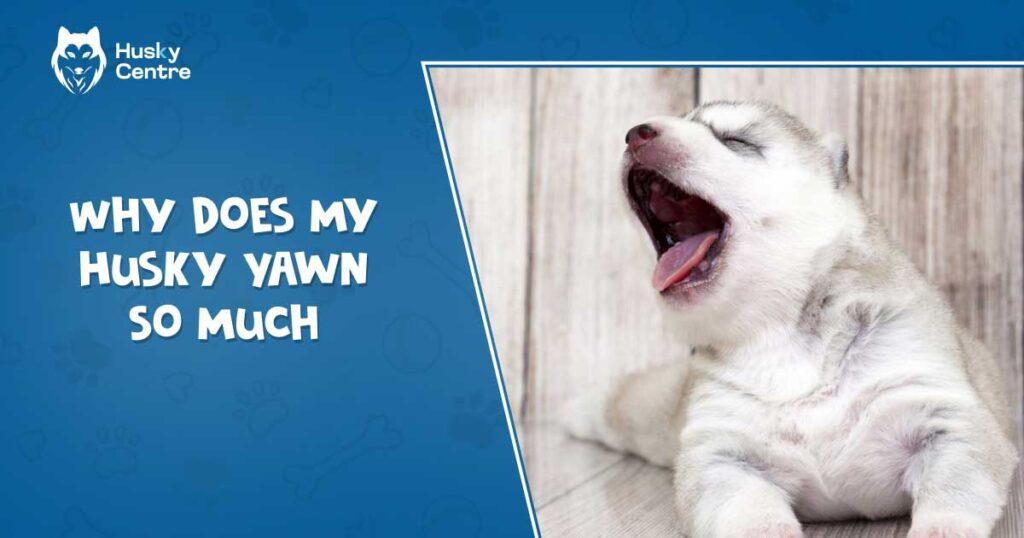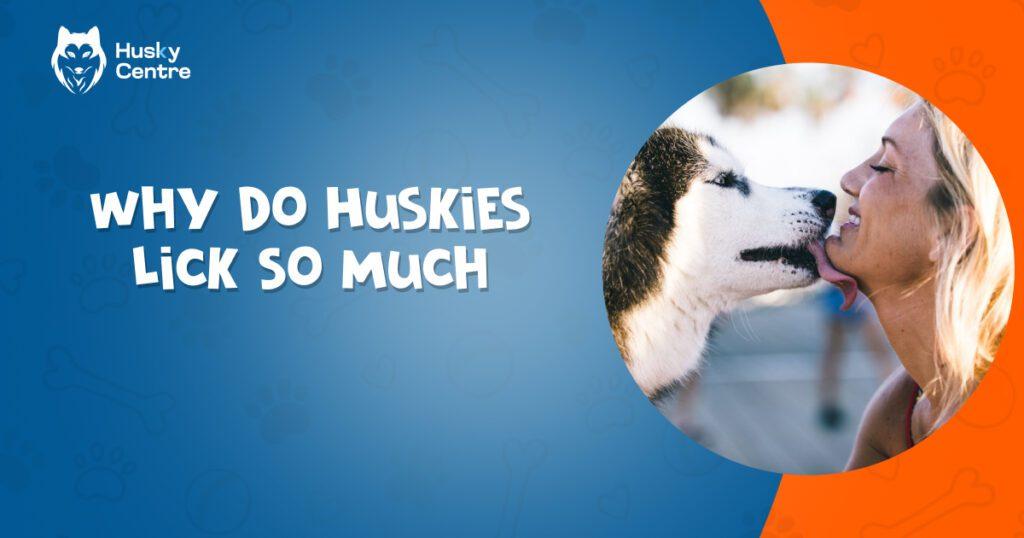Your Husky yawns frequently due to boredom, stress, or to communicate. It might also be tired or trying to cool down.
Huskies are known for their expressive behavior and yawning is a common trait among them. Yawning serves multiple purposes such as indicating boredom, stress, or even signaling a need for attention. In some cases, it could be a sign of tiredness or a way to cool their body.
Understanding the context of your Husky’s yawning can help you address its needs more effectively. Observing other behaviors and the environment can provide clues to why your Husky yawns so much. Ensuring a stimulating and comfortable environment can reduce excessive yawning in your furry friend.
Understanding Yawning In Dogs
Many Husky owners wonder, “Why does my Husky yawn so much?” Understanding yawning in dogs can help you better interpret your Husky’s behavior. Yawning is a common and natural action in dogs, much like it is in humans.
But it can mean different things. In this post, we will delve into the reasons behind this curious habit and shed light on its significance in your furry friend’s life.
Explanation Of Yawning As A Natural Behavior
Yawning is a natural behavior in dogs that serves several purposes. Here are some key points to understand:
- Relaxation and Comfort: Dogs often yawn to show they are relaxed or comfortable in their environment.
- Communication: Yawning can be a way for dogs to communicate with their owners or other dogs. It can signal that they are not a threat.
- Temperature Regulation: Yawning helps regulate a dog’s body temperature, especially after exercise or in warm conditions.
- Stress and Anxiety: Dogs may yawn more when they are stressed or anxious. It’s their way of coping with uncomfortable situations.
To better understand why your Husky yawns, observe their context and body language. For instance, if your dog yawns while stretching or settling down, it likely means they are relaxed. But if they yawn during a vet visit or in a noisy environment, it may indicate stress.
| Yawning Trigger | Possible Meaning |
| After a walk or playtime | Cooling down |
| When meeting new people or dogs | Non-threatening communication |
| During training sessions | Stress or confusion |
Differences Between Human And Canine Yawning
Both humans and dogs yawn, but the reasons can differ. Here’s a look at some key differences:
- Humans: People yawn due to boredom, tiredness, or to increase alertness. It’s often a sign of needing rest or sleep.
- Dogs: For dogs, yawning can signal a variety of things, from relaxation to stress. It’s more complex and context-dependent.
One interesting aspect is contagious yawning. In humans, seeing someone yawn can trigger a yawn. Some studies suggest dogs might also experience this, especially with their owners. This could be a sign of empathy and social bonding.
Let’s compare the triggers for yawning in humans and dogs:
| Trigger | Humans | Dogs |
| Boredom | Common | Less common |
| Tiredness | Common | Sometimes |
| Stress or Anxiety | Occasional | Common |
| Social Interaction | Rare | Common |
Understanding these differences can help you better interpret your Husky’s yawning. It’s a way to connect with their emotional and physical state.
Pay attention to the context and frequency of your dog’s yawns to gain insights into their well-being.
Common Reasons Why Huskies Yawn
Have you ever wondered why your husky yawns so much? Yawning is a common behavior in dogs, but it can have various meanings.
Understanding the common reasons why huskies yawn can help you ensure your furry friend is happy and healthy.
Stress Or Anxiety
Stress and anxiety are common reasons why huskies yawn. When a husky feels stressed, they may yawn to calm themselves down. This behavior can be seen in various situations:
- Meeting new people or dogs: Huskies may yawn when they meet new faces as a way to relieve stress.
- Loud noises: Thunderstorms, fireworks, or other loud noises can make a husky anxious, leading to yawning.
- Vet visits: The unfamiliar environment and procedures at the vet can cause stress-induced yawning.
Recognizing these signs can help you understand when your husky is feeling anxious. Providing a calm and safe environment can reduce stress-related yawning.
Fatigue Or Sleepiness
Just like humans, huskies yawn when they are tired or sleepy. This type of yawning is usually accompanied by other signs of fatigue:
- Drooping eyes: A sleepy husky will often have half-closed or droopy eyes.
- Slow movements: Tired huskies move more slowly and might not be as playful.
- Resting more often: You may notice your husky lying down or seeking a comfortable spot to rest.
To ensure your husky gets enough rest, provide a quiet and cozy sleeping area. Regular exercise can also help regulate their sleep patterns and reduce excessive yawning due to fatigue.
Communication And Social Signals
Yawning in huskies can also be a form of communication and social signaling. Dogs use body language to express themselves, and yawning is one of the ways they do this:
- Showing submission: A husky might yawn to show submission to another dog or person, indicating they are not a threat.
- Mimicking behavior: Dogs often yawn in response to seeing another dog or human yawn, known as contagious yawning.
- Calming signals: Yawning can be a way for huskies to calm themselves or others in a stressful situation.
Understanding these social signals can improve your communication with your husky, fostering a stronger bond.
Temperature Regulation
Huskies may yawn to help with temperature regulation. This is particularly important for breeds with thick fur like huskies. Yawning can help cool the brain and body:
- Hot weather: In warm conditions, yawning helps regulate body temperature.
- Exercise: After physical activity, huskies may yawn to cool down.
Ensuring your husky stays cool in hot weather can reduce yawning. Provide plenty of water and shade, and avoid intense exercise during the hottest parts of the day.
When To Be Concerned About Excessive Yawning
Huskies, like many other dogs, yawn for various reasons. It can be a sign of being tired, feeling stressed, or even being excited. But when does yawning become a concern?
Understanding why your Husky yawns excessively is crucial for ensuring their health and well-being. Let’s dive into some of the key indicators and situations where excessive yawning might signal a problem.
Indicators Of Potential Health Issues
Excessive yawning can sometimes indicate health issues in Huskies. Pay attention to the following signs to determine if there might be an underlying problem:
- Lethargy: If your Husky yawns a lot and seems unusually tired or inactive, it might be a sign of illness.
- Loss of Appetite: A noticeable drop in appetite along with frequent yawning can be a red flag.
- Respiratory Problems: Yawning can signal breathing difficulties. Look for symptoms like coughing or labored breathing.
- Behavioral Changes: Sudden changes in behavior, such as aggression or withdrawal, paired with yawning, may indicate distress.
Here’s a quick reference table to help identify potential health issues:
| Indicator | Possible Health Issue |
| Lethargy | Illness or fatigue |
| Loss of Appetite | Digestive issues or stress |
| Respiratory Problems | Breathing difficulties |
| Behavioral Changes | Mental distress or pain |
Situations Where Yawning Could Signal Discomfort Or Pain
Yawning isn’t always just a sign of sleepiness. In certain situations, it can indicate discomfort or pain. Consider these scenarios:
- During or After Physical Activity: Excessive yawning during or after playtime might mean your Husky is experiencing physical pain or exhaustion.
- In New Environments: Yawning in unfamiliar places can be a sign of stress or anxiety. Your Husky might feel uncomfortable or scared.
- When Interacting with Other Dogs: Frequent yawning during dog-to-dog interactions can indicate that your Husky feels threatened or uneasy.
- While Being Handled: If your Husky yawns a lot when being petted or groomed, it might be a sign of pain or discomfort.
Understanding these situations can help you address any discomfort your Husky might be experiencing. Here’s a summary table for easy reference:
| Situation | Possible Discomfort or Pain |
| During/After Physical Activity | Physical pain or exhaustion |
| In New Environments | Stress or anxiety |
| Interacting with Other Dogs | Feeling threatened or uneasy |
| While Being Handled | Pain or discomfort |
Tips For Managing Excessive Yawning
Huskies are known for their expressive behaviors, including yawning. While yawning can be a natural part of their daily routine, excessive yawning might be a sign of underlying issues.
Understanding the reasons behind your husky’s frequent yawning and implementing effective tips can help in managing this behavior. Let’s dive into some actionable tips for managing excessive yawning in your husky.
Identifying And Reducing Stressors In The Environment
Stress is a common reason why your husky might yawn excessively. Identifying and reducing stressors in your pet’s environment can significantly improve their well-being. Here are some practical steps to follow:
- Create a peaceful space: Ensure your husky has a quiet and comfortable area to relax.
- Limit exposure to loud noises: Sudden loud noises can be stressful. Keep the environment calm.
- Regular routine: Dogs thrive on routine. Stick to a consistent feeding and walking schedule.
- Positive reinforcement: Use treats and praise to encourage calm behavior.
Additionally, observe your husky’s interactions with other pets and people. If certain interactions cause stress, it might be best to limit them.
| Potential Stressor | Action to Reduce Stress |
| New Pets | Gradual Introduction |
| Strangers | Controlled Socialization |
| Unfamiliar Surroundings | Frequent Short Visits |
Ensuring Your Husky Gets Enough Rest And Exercise
Rest and exercise are crucial for your husky’s overall health. Adequate physical activity and sleep can reduce excessive yawning. Here’s how to ensure your husky gets enough rest and exercise:
- Daily walks: Take your husky for at least two long walks each day.
- Playtime: Engage in interactive play sessions like fetch or tug-of-war.
- Mental stimulation: Use puzzle toys to keep their mind active.
- Comfortable sleeping area: Provide a cozy bed in a quiet part of the house.
Remember, huskies are active dogs. They need regular exercise to stay happy and healthy. Lack of exercise can lead to boredom and stress, causing excessive yawning.
Also, ensure your husky has a consistent sleep schedule. Just like humans, dogs need a regular sleep pattern for optimal health.
Consulting A Veterinarian If Yawning Persists Or Is Accompanied By Other Symptoms
Persistent yawning could indicate a health issue. If your husky’s yawning continues despite addressing stress and ensuring rest, it’s time to consult a veterinarian. Look out for these additional symptoms:
- Lethargy: Unusual tiredness or lack of energy.
- Loss of appetite: Refusal to eat or drink.
- Behavioral changes: Uncharacteristic aggression or withdrawal.
- Physical symptoms: Coughing, sneezing, or signs of pain.
Your vet will conduct a thorough examination to rule out any medical conditions. They might recommend tests such as blood work or imaging to diagnose the issue.
| Symptom | Possible Condition |
| Lethargy | Infection |
| Loss of Appetite | Digestive Issues |
| Behavioral Changes | Anxiety |
Early intervention is key. Timely veterinary care can help address the root cause of excessive yawning and ensure your husky stays healthy and happy.
Frequently Asked Questions
What Does It Mean When A Dog Yawns Excessively?
Excessive yawning in dogs often signals stress, anxiety, or discomfort. It can also indicate tiredness or boredom. Consulting a vet is advisable.
Do Dogs Yawn To Show Affection?
Yes, dogs yawn to show affection. Yawning can signal empathy and comfort when they are around their owners.
What Does A Dog Stress Yawn Look Like?
A dog stress yawn looks exaggerated, with wide-open jaws and a longer duration than a regular yawn. The dog’s eyes may appear tense.
Do Dogs Yawn As A Warning?
Dogs yawn for various reasons, including stress or anxiety. It can sometimes serve as a calming signal, not necessarily a warning.
Conclusion
Understanding why your husky yawns frequently helps in ensuring their health and happiness. Regular yawning can be normal or indicate stress. Observing their behavior closely and consulting a vet when needed keeps your furry friend content. Keep an eye on changes and always prioritize their well-being.


Meet Jarred, the heart and soul behind HukyCentre. With a deep affection for furry friends, he pours his passion into every word he writes. His genuine love for dogs shines through in his engaging and informative content. As a dedicated dog enthusiast, Jarred’s goal is to share valuable insights and tips that resonate with fellow dog lovers. Join Jarred on the journey as he celebrates the joy and companionship that dogs bring into our lives.



